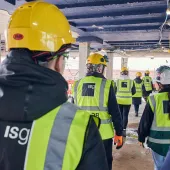UK construction faces challenges from cost rises and tariffs
New government investment in infrastructure and skills will support UK construction growth, but rising costs and global trade tensions remain major concerns, according to Barbour ABI.
Following the 2025 Spring Statement, the UK government announced a series of measures designed to boost infrastructure and housing. These include £4.8 billion committed to the Strategic Road Network for 2025–26, with £1.3 billion earmarked for road renewals and £1.6 billion for local road maintenance — a record level of spending on the nation’s highways.
Barbour ABI’s Construction Project Leads platform currently tracks 3,704 road projects due to start within the next year, including major schemes such as the £9 billion Lower Thames Crossing.
Housing also received a boost, with £2 billion allocated for social and affordable housing between 2026 and 2027, aiming to deliver up to 18,000 new homes. This forms part of the government’s wider ambition to build 1.5 million new homes by 2030. However, concerns remain over whether skills shortages could limit delivery.
To address these challenges, the government has announced £625 million over four years to train an additional 60,000 construction workers through initiatives such as apprenticeships, skills bootcamps and the creation of 10 Technical Excellence Colleges.
Ed Griffiths, head of business and client analytics at Barbour ABI, said: "The £625 million investment is a significant step towards addressing the skills shortage. However, rising construction costs, labour shortages, and training challenges may impact its effectiveness."
Griffiths highlighted that construction costs are projected to rise by 12% by 2030, driven by an 18% increase in labour costs and a 15% rise in material prices, including timber and steel. Labour shortages, exacerbated by Brexit and recent increases in migrant labour certificate fees, add further pressure.
He also noted persistent difficulties with retaining apprentices and called for reforms to the Construction Industry Training Board (CITB) to ensure training better matches industry needs.
Meanwhile, potential new tariffs proposed by US President Donald Trump could add further strain. Although not yet implemented, a 10% baseline tariff on imports — and higher rates on key materials like steel and aluminium — could drive up material costs in the UK, adding to existing supply chain challenges.
Prime Minister Keir Starmer has stated that the UK remains committed to protecting British businesses and is seeking to secure economic agreements with the US to mitigate any future trade impacts.
Despite the uncertainty, the announcement of a £2 billion Universal Studios resort in Bedford offers a positive signal for the construction and tourism sectors. The project, due to start in January 2026, is expected to create 28,000 jobs before opening in 2031 and attract 8.5 million visitors in its first year.
The scheme, led by Universal Destinations and Experiences, will include new theme park rides, a 500-room hotel, and major road and rail improvements.



